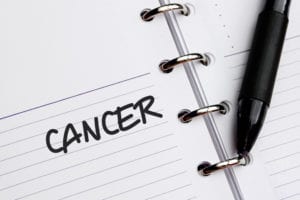Written by Jessica Patella, ND. Supplementing with nicotinamide (Vitamin B3) for twelve months resulted in significant reductions in squamous-cell carcinomas, basal-cell carcinomas and pre-cancerous actinic keratosis of 30%, 20%, and 13% respectively in the group of 193 participants compared to the placebo group.
 According to the American Academy of Dermatology, skin cancer is the most common cancer, with non-melanoma skin cancer affecting 3 million Americans yearly 1. It is estimated that in the U.S., 1-in-5 people will develop skin cancer in their lifetime 1. Recent research has found that supplementing with nicotinamide (vitamin B3) can decrease the number of new non-melanoma skin cancers and pre-cancerous actinic keratosis in high-risk individuals compared to a placebo 2.
According to the American Academy of Dermatology, skin cancer is the most common cancer, with non-melanoma skin cancer affecting 3 million Americans yearly 1. It is estimated that in the U.S., 1-in-5 people will develop skin cancer in their lifetime 1. Recent research has found that supplementing with nicotinamide (vitamin B3) can decrease the number of new non-melanoma skin cancers and pre-cancerous actinic keratosis in high-risk individuals compared to a placebo 2.
Non-melanoma skin cancers are primarily caused by exposure to ultraviolet (UV) radiation and can be prevented with the use of sunscreen, but use of sunscreen tends to be suboptimal 2. The UV radiation causes damage to DNA; however, nicotinamide is a precursor for energy in the body and has been shown to increase DNA repair 2,3.
This phase-three randomized trial included 386 participants who were randomly divided to a nicotinamide group (n=193) or a placebo group (n=193). The participants received either nicotinamide (500 mg twice daily; 1,000 mg total) or placebo for 12-months. Dermatologists, who were unaware of which group the participant was in, then performed skin cancer checks at baseline and every 3 months for a total of 18 months 2.
The results were as follows:
- The average number of non-melanoma skin cancers per person through the 12-months was significantly lower by 23% in the nicotinamide group compared to the placebo group (1.8 [total of 336 cancers] vs. 2.4 [total of 463 cancers], 95% CI 4-38, P=0.02)
- At each 3-month visit during the 12-month period, new non-melanoma skin cancers were lower in the nicotinamide group compared to placebo (significant by 12-months p=0.09)
- The average number of basal-cell carcinomas per person was 20% lower in the nicotinamide group compared to the placebo group ( 95% CI, -6 to 39, P = 0.12)
- The average number of squamous-cell carcinomas per person was 30% lower in the nicotinamide group compared to the placebo group (95% CI, 0-51, P=0.05)
- The number of actinic keratosis was also lower in the nicotinamide group compared to placebo at each visit (11% lower at 3-months (p=0.01), 14% lower at 6-months (p<0.001), 20% lower at 9-months (P<0.001), 13% lower at 12-months (P=0.001)).
The rate of sunscreen use was lower in the nicotinamide group. There was also no difference between the groups in incidences of melanoma skin cancers. After nicotinamide supplementation was stopped, the effect greater than placebo was not maintained, indicating that nicotinamide needs to be continually supplemented. It is also important to note that nicotinamide does not cause flushing like niacin does.
In conclusion, supplementing with nicotinamide was associated with a lower risk of non-melanoma type cancers and actinic keratosis compared to placebo. Nicotinamide is inexpensive and easily available and researchers felt it was a new opportunity for chemoprevention of non-melanoma skin cancers in clinical practice 2.
Source: Chen, Andrew C., Andrew J. Martin, Bonita Choy, Pablo Fernández-Peñas, Robyn A. Dalziell, Catriona A. McKenzie, Richard A. Scolyer et al. “A phase 3 randomized trial of nicotinamide for skin-cancer chemoprevention.” New England Journal of Medicine 373, no. 17 (2015): 1618-1626.
© 2015 Massachusetts Medical Society.
Posted May 1, 2018.
References:
- AAD. Skin Cancer. 2018; Overview of skin cancer. Available at: https://www.aad.org/media/stats/conditions/skin-cancer Accessed April 30, 2018, 2018.
- Chen AC, Martin AJ, Choy B, et al. A phase 3 randomized trial of nicotinamide for skin-cancer chemoprevention. New England Journal of Medicine. 2015;373(17):1618-1626.
- Thompson BC, Surjana D, Halliday GM, Damian DL. Nicotinamide enhances repair of ultraviolet radiation‐induced DNA damage in primary melanocytes. Experimental dermatology. 2014;23(7):509-511.

